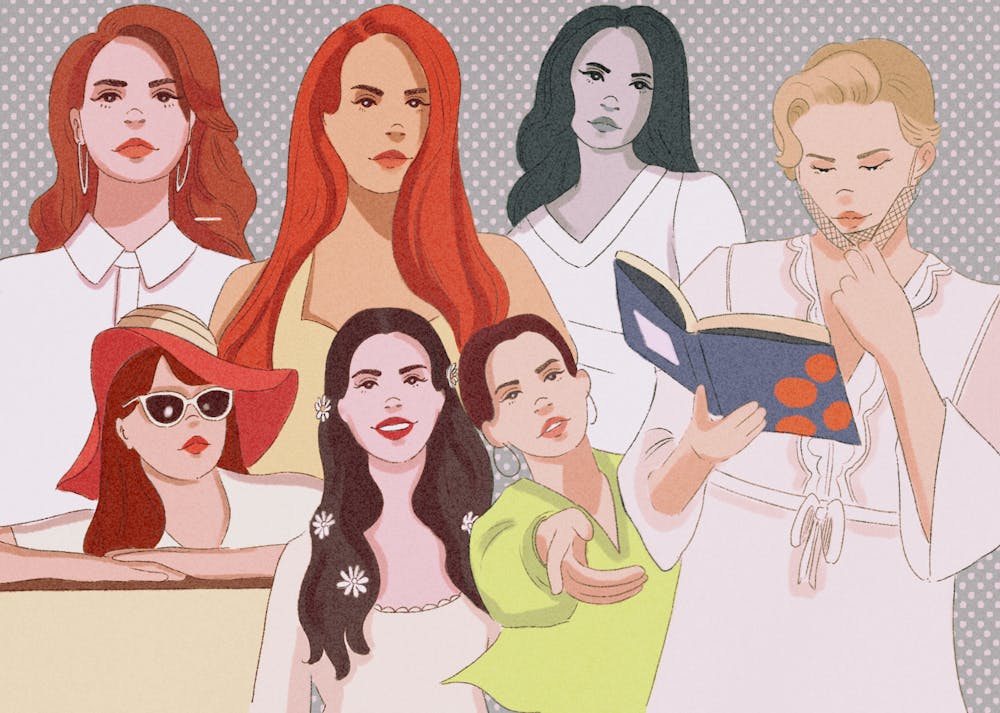Content warning: This article contains mentions of domestic violence and other sensitive issues. For additional resources, contact the national domestic violence hotline at 800-799-SAFE (7233) or visit their website.
Since her most recent release, "Chemtrails over the Country Club" on March 19, singer-songwriter Lana Del Rey has already announced a second project titled "Rock Candy Sweet." And, in true Lana Del Rey fashion, the announcement was done in a very interesting way.
"Just want to thank you again for the kind articles like this one and for reminding me that my career was built on cultural appropriation and glamorizing domestic abuse. I will continue to challenge those thoughts on my next record on June 1 titled 'Rock Candy Sweet,'" Del Rey wrote on her Instagram story.
The statement was written over a screenshot of Harper Bazaar's article, "Lana Del Rey Can't Qualify Her Way Out of Being Held Accountable."
While viewers unbeknownst to Del Rey's past may find the comment bizarre, a look through her career shows she is no stranger to controversy, and her most recent era is nothing but a continuation.
Del Rey has long been associated with problematic undertones of glamorizing abuse. Domestic violence imagery has made itself apparent in her cover art — the artwork for her 2012 single "Blue Jeans" pictures the singer in a chokehold from a tattooed man.
Beyond visual art, themes of romanticizing abuse run through her lyrics as well.
In "Ultraviolence," the title track from her 2014 album, Del Rey sings "he hit me and it felt like a kiss." Her song "Off To The Races" perpetuates outdated gender norms in the lyrics "tell me you own me."
During one of her most recent attempts to address the "culture" that has labeled her work a glamorization of abuse, Del Rey took to an Instagram post on May 21, 2020, digging herself into a deeper hole when she expressed her attitude toward women of color in the music industry.
"With all the topics women are finally allowed to explore I just want to say over the last 10 years I think it's pathetic that my minor lyrical exploration detailing my sometimes submissive or passive roles in my relationships has often made people say I've set women back hundreds of years," Del Rey wrote.
"There has to be a place in feminism for women who look and act like me."
While Del Rey's exploration of domestic abuse and control in unhealthy relationships has long been considered problematic and harmful to impressionable listeners, her social media post invited society to question creative rights — humans make art to express emotions and experiences.
With a topic so triggering, how is it possible to convey experiences and ideas Del Rey does without glamorizing it?
"It's important that people have an ability to contextualize how the violence came to be in the relationship," said Megan Lindsay, research assistant professor at the School of Social Work. "If there's a simplification of characters, especially of victims where (an artist) makes them to be very one dimensional and submissive, it's misleading.
"Victims of violence are much more aggressive than they are portrayed in the media. They're afraid, but that doesn't mean they don't lash out."
In the context of Del Rey's work, women in her songs are made to be submissive and simple — Del Rey has too labeled herself a submissive woman.
The idea violence is tragically beautiful to Del Rey, as seen in her lyrics, adds to a misleading portrayal of domestic abuse situations, Lindsay said.
"That line (from Ultraviolence) is provocative because it implies that she likes being abused. It's not only problematic, but it's just not true. Most people experiencing violence hate it," she said. "What they want more than anything is respect from their partner, but they receive violence instead. There's great emotional pain to that as well, as it shows that their partner would rather hurt them than understand them."
While analyzing Del Rey's career with expertise on domestic violence proves problematic elements can be found, the question of creative freedom still remains.
With a history of unhealthy relationships sprawled throughout her discography, Del Rey seems to be speaking about domestic violence from her own personal experience — criticizing her work, therefore, appears to be invalidating.
"Experiences are complicated. You can't put the lives of others in the same box. I don't think we can ever avoid controversy when it comes to making art about abuse," Lindsay said. "Her feeling the responsibility to hide her experiences as a shameful secret is very counterproductive if she has experienced violence. Her being open and honest and exploring it in a critical way is interesting and good for her."
The controversy is a double-edged sword, said Lindsay.
"Domestic abuse evokes controversy because it makes people feel something that isn't at all desirable. People also have such low levels of accurate information when it actually comes to abuse and how it manifests," she said. "I feel that we're better off hearing honest experiences than shielding impressionable audiences from something that might hurt them. It's true that they might embody this as a glamorous thing or something to strive for as they try to be her, but that discredits the intelligence that women have."
But so long as Del Rey continues to create music around the subject, there will continue to be concern about its intent.
"The thought that people might think that real love has to have violence after consuming this media is entirely concerning, but so is the thought that there's no honest representation, or representation at all in that case. It needs to be talked about, even if it's brought about in a confusing way," Lindsay said.
Reach the reporter at jecote@asu.edu and follow @jillianecote on Twitter.
Like The State Press on Facebook and follow @statepress on Twitter.
Continue supporting student journalism and donate to The State Press today.




